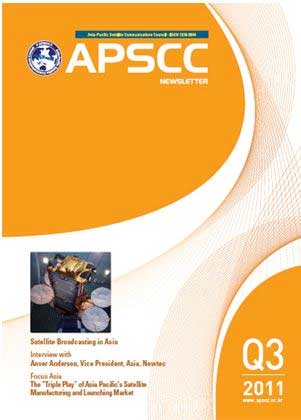
APSCC Newsletter
Interference prevention and mitigation are to be addressed in the Asia-Pacific region through closer collaboration between national, regional and global satellite industry groups. The quality-assurance plans were announced during an Interference-Prevention Summit co-organized by the Interference Reduction Group (IRG), Global VSAT Forum (GVF) and Indonesian Satellite Industry Association (ASSI) in conjunction with the Asia Pacific Satellite Communications Council (APSCC) conference held here on 27-29 September.
The plans, which have already begun to be implemented in several Asian nations, arise from a broader global collaboration of the satellite industry with the World Broadcasting Unions - International Satellite Operations Group (WBU-ISOG) and the Radio Frequency Interference - End User Initiative. Through the plans, four parallel initiatives are underway: Training, product quality assurance, spectrum management, and carrier ID. The first three facets of the plan are designed to help prevent interference, while the fourth aims to help industry more effectively respond when interference incidents occur.
"Asian demand for satellite communications services is escalating exponentially, and it is time for the industry to provide even higher assurances of quality of service," said a joint statement of APSCC, ASSI, GVF and IRG. "Strengthening skills, product performance, spectrum management, and satellite operator's ability to react to interference incidents will enable the industry to continue to provide the high level of service that users have come to expect."

- Training & Certification: Training Centres have been established in Indonesia, India, Thailand, and Australia, and VSAT Installation Certification of personnel is underway.
- Product Quality Assurance: Testing of earth station equipment is being conducted by satellite operators and through co-ordination of industry.
- Spectrum Management: Advocacy for protection of satellite frequencies -- including C, Ku, L and Ka-band -- is being co-ordinated, and the Indonesian and other governments have begun to respond favorably.
- Carrier ID: A process and development for using this system globally has been initiated by IRG and several manufacturers have now incorporated the NIT carrier ID capability in their earth station equipment and inclusion of new carrier ID technology in to the DVB Forum.
The collaborative plan is the latest in a series of international efforts. Last month, during the IBC Exhibition & Conference in Amsterdam, GVF and IRG held a similar summit in collaboration with the World Broadcasting Unions - International Satellite Operations Group (WBU-ISOG) and the Radio Frequency Interference - End User Initiative (RFI-EUI). During the Summit, Eutelsat announced that they plan to require all uplinks to have a carrier-ID capability during the 2012 Olympics in London.
The next Summit is scheduled to be held this month in New York City, where GVF, IRG, WBU-ISOG and RFI-EUI will hold the Satellite Interference-Mitigation Forum on October 11, the day preceding SATCON 2011. HBO will host the Forum, which will be held from 9 a.m. - 5 p.m., providing an opportunity to learn about the latest solutions being applied to improve quality of service and reduce operational costs.

